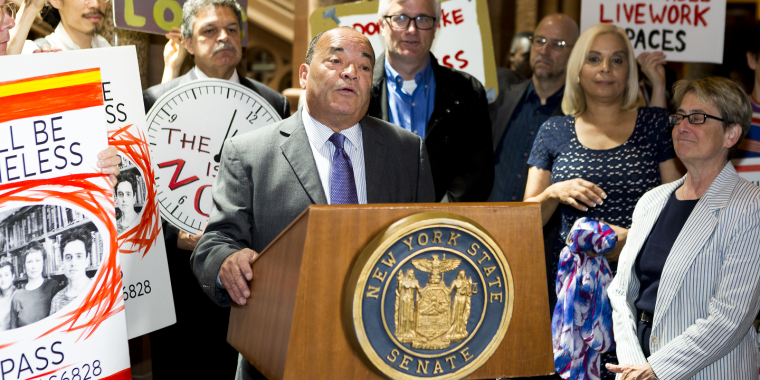
Senator Dilan Proposes Practical and Realistic Framework for Reforming New York’s Redistricting Process
Martin Malavé Dilan
May 26, 2010
-
ISSUE:
- Legislature
- Census
Senator Martin Malavé Dilan (D-Brooklyn) has introduced key legislation to make New York’s redistricting process more open, accountable and free of partisan politics.
Senate bills 7881 and 7882 each bolster public participation in the decennial redistricting process through bi-partisan appointed advisory commissions. Each bill requires a commission to develop the Senate, Assembly and Congressional Districts of New York, and submit them to the legislature for approval.
“For what’s at stake when it comes to legislative redistricting, we need a truly partisan-free process, ” said Senator Dilan, Co-Chair of the Legislative Task Force on Demographic Research and Reapportionment. “These two bills without a doubt remove the ability of any one political party to disenfranchise voters through the illicit redrawing of legislative lines.”
Senate bill 7881 establishes a 12-member Legislative Commission on Redistricting and Demographic Research. The Temporary President of the Senate, the Senate Minority Leader, the Speaker of the Assembly and the Assembly Minority Leader each appoint two members to the commission. In addition, four members of the public will sit on the commission and must be appointed by a vote of at least six of the eight legislative commissioners.
Senate bill 7882 establishes the nine-member Legislative Advisory Commission on Redistricting and Demographic Research. The core eight members are non-legislators appointed by Senate and Assembly leaders. The ninth member will serve as chair and must be appointed by a vote of at least six of eight commissioners.
Each proposal keeps with Senator Dilan’s goal to create an objective and transparent redistricting process that maximizes public participation at minimal public cost. Both proposals call for minimal population deviation, the elimination of regional bias and district compactness and contiguity -- all of which complies with jurisdictional boundary requirements set forth in the State Constitution.
Both proposals would also address a long-standing civil rights issue regarding the counting of prisoners for redistricting purposes. Prisoners incarcerated in state institutions would be counted at their “home of record” for Senate and Assembly redistricting. In addition, the redistricting process would comply with the federal Voting Rights Act.
The commission proposals are modeled after a major 2007 report issued by the New York City Bar Association titled: “A Proposed New York State Constitutional Amendment to Emancipate Redistricting from Partisan Gerrymanders: Partisanship Channeled for Fair Line-Drawing.”
Written in 2007, the report called for an independent commission which would have to be established through Constitutional Amendment. Senator Dilan’s proposals keep the process within legislative responsibility because sufficient time does not exist in the current redistricting process for a State Constitutional Amendment that is necessary to enact an independent commission.
Both houses of the legislature must approve the formation of the commission, in two different legislative sessions. To be in effect for 2012 redistricting, legislation would have to pass this year, next year, and then a statewide referendum must go before voters in November 2011. Assuming the referendum was approved by voters, the legislature would have four months to select commission members, hire staff, budget resources, and ultimately draft redistricting proposals that would meet both the federal Voting Rights Act and state election calendars – a logistical improbability.
“Whichever of these two proposals moves forward, both provide for fairer redistricting, with greater public participation and can actually be implemented upon passage. Under these proposals we can end the regional bias and insidious gerrymandering of the past. And in doing so, create better representation for all New Yorkers,” Senator Dilan concluded.



